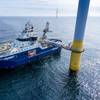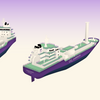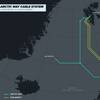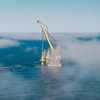RayClean BWTS is IMO and DNV Type Approved
Ballast water treatment system RayClean, developed by DESMI Ocean Guard, has received IMO and DNV type approval.
On September 5, 2014 DNV GL issued type approval certificate for the RayClean system. The type approval certificate includes approval according to both the IMO Ballast Water Management Convention and the DNV type approval program.
The type approval is unique because this is the first time a ballast water treatment system has been tested fully according to both IMO and U.S. Coast Guard requirements, DESMI said. This is also revealed on the certificate where it is stated that the RayClean system has undergone 15 land-based tests, five in each salinity, and five shipboard tests as per U.S. Coast Guard test requirements. IMO requires 10 land-based tests in two salinities, and three shipboard tests.
But the RayClean system has undergone much more additional testing than this in order to comply with the U.S. Coast Guard test requirements. During land-based testing an “operation and maintenance” test with treatment of 10,000 metric tons of ballast water has been performed, and the electrical equipment in the system has been through significantly more demanding vibration tests than required by IMO, just to mention a few. This, combined with the fact that only U.S. Coast Guard approved Independent Lab and test facilities were used throughout the entire testing program, puts the RayClean system in pole position for the U.S. Coast Guard type approval, which no system has been awarded yet.
The RayClean system is based on filtration and highly efficient UV treatment with low pressure UV lamps. The performance demonstrated by the RayClean system during the extensive approval testing is second to none, and this is documented on the certificate where following is stated:
- Approved for operation in all salinities.
- Approved for operation in all sea temperatures
- Approved for treatment of water with UV-Transmission anywhere from 33% to 100%
“When we started the development and approval of the RayClean system three years ago, it was clear to us that not only should the system be approved to work in all salinity regimes, we also wanted a system that would be able to treat water in compliance with the IMO and USCG discharge requirements everywhere in the world. And this is where the UV-Transmission limitation comes into the picture,” said Rasmus Folsø, CEO of DESMI Ocean Guard.
Folsø continued, “Several of the world’s most busy ports are located at river estuaries, where fresh water with very low UV transmission constantly fills the port basin. Shanghai is an example of this, and here we have measured UV-Transmission values significantly below 50%. However, there are only two UV based ballast water treatment systems in the world to date which are certified for treatment of water with UV-Transmission of e.g. 40%; the two DESMI Ocean Guard systems OxyClean and RayClean.”
“We experience that this issue receives more and more attention from shipowners, because it could potentially cause big problems during operation of the vessel. If you operate a ballast water treatment system in water with a lower UV-Transmission than what the system is approved for, the system will generate an alarm, which will be stored in the log of the system. When arriving at e.g. a US port the authorities will require documentation regarding the ballast water you wish to discharge, and part of this documentation is the ballast water treatment system log. If this shows an alarm for too low UV-transmission, the ballast water has not been treated according to requirements and the shipowner may not be allowed to discharge the ballast water.”
The RayClean system will be displayed during SMM exhibition in Hamburg from September 9-12 at the DESMI stand in the Danish Pavilion, stand no B1.EG.310.
desmioceanguard.com










